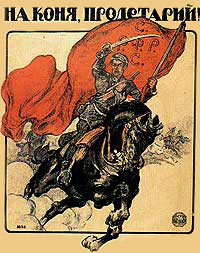 The
October Revolution was the culmination of a long period of repression
and unrest. From the time of Peter I,
the Tsardom increasingly became an autocratic bureaucracy that
imposed its will on the people by force, with wanton disregard
for human life and liberty. As Western technology was adopted
by the Tsars, Western humanitarian ideals were acquired by a
group of educated Russians. Among this growing intelligentsia,
the majority of whom were abstractly humanitarian and democratic,
there were also those who were politically radical and even
revolutionary. The university became a seat of revolutionary
activity; nihilism , anarchism , and later Marxism were espoused
and propagated. The
October Revolution was the culmination of a long period of repression
and unrest. From the time of Peter I,
the Tsardom increasingly became an autocratic bureaucracy that
imposed its will on the people by force, with wanton disregard
for human life and liberty. As Western technology was adopted
by the Tsars, Western humanitarian ideals were acquired by a
group of educated Russians. Among this growing intelligentsia,
the majority of whom were abstractly humanitarian and democratic,
there were also those who were politically radical and even
revolutionary. The university became a seat of revolutionary
activity; nihilism , anarchism , and later Marxism were espoused
and propagated.
|
 Years
1915-1916 were the years of the World War One. Drawn into the
war, Russians died on the front. Those years were the years
of complete chaos in people's hearts and minds. Years
1915-1916 were the years of the World War One. Drawn into the
war, Russians died on the front. Those years were the years
of complete chaos in people's hearts and minds.
By the eve of World War I, Russia had undergone rapid industrial
development, much of it fueled by foreign investment and the
import of technology from Western Europe. Key industries included
textiles, metal-working, and chemical and oil production. At
the same time, many people lived in appallingly backward conditions,
especially in the countryside.
|
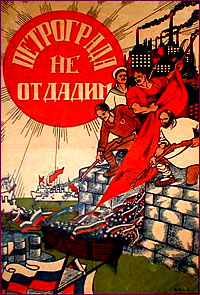 Economic
conditions in Russia drastically worsened during World War I,
contributing to the growth of revolutionary movements and ultimately
the overthrow of the tsar and the destruction of the empire. Economic
conditions in Russia drastically worsened during World War I,
contributing to the growth of revolutionary movements and ultimately
the overthrow of the tsar and the destruction of the empire.
On March 2nd 1917, Nicholas II,
the Tsar of Russia, abdicated. His family had ruled Russia for
nearly three hundred years, but their demise occurred in a matter
of days. Nicholas tried to pass the throne on to his brother
Michael, but he refused and also abdicated on March 3rd. The
situation in Russia was so bad that Michael could see a future
for the royal family.
|
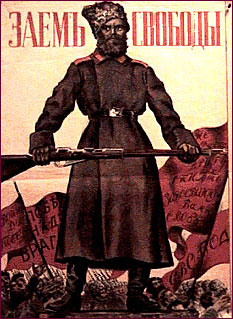 In
April 1917 Lenin and other revolutionaries
returned to Russia after having been permitted by the German
government to cross Germany. The Germans hoped that the Bolsheviks
would undermine the Russian war effort. Lenin galvanized the
small and theretofore cautious Bolshevik party into action.
The courses he advocated were simplified into the powerful slogans
- "End the war",
"All land to the peasants",
and "All power to the soviets". In
April 1917 Lenin and other revolutionaries
returned to Russia after having been permitted by the German
government to cross Germany. The Germans hoped that the Bolsheviks
would undermine the Russian war effort. Lenin galvanized the
small and theretofore cautious Bolshevik party into action.
The courses he advocated were simplified into the powerful slogans
- "End the war",
"All land to the peasants",
and "All power to the soviets".
The failure of the all-out military offensive in July
increased discontent with the provisional government, and
disorders and violence in Petrograd led to popular demands
for the soviet to seize power. The Bolsheviks assumed direction
of this movement, but the soviet still held back. The government
then took strong measures against the Bolshevik press and
leaders. Nevertheless, the position of the provisional government
was precarious.
|
|
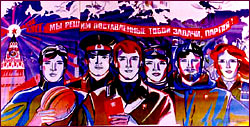 Prince
Lvov resigned in July because of his opposition to Chernov's
cautious attempts at land reform. He was replaced by Kerensky,
who formed a coalition cabinet with a socialist majority.
Army discipline deteriorated after the failure of the July
offensive. The provisional government and the Menshevik and
Socialist Revolutionary leaders in the soviet lost support
from the impatient soldiers and workers, who turned to the
Bolsheviks. Prince
Lvov resigned in July because of his opposition to Chernov's
cautious attempts at land reform. He was replaced by Kerensky,
who formed a coalition cabinet with a socialist majority.
Army discipline deteriorated after the failure of the July
offensive. The provisional government and the Menshevik and
Socialist Revolutionary leaders in the soviet lost support
from the impatient soldiers and workers, who turned to the
Bolsheviks.
|
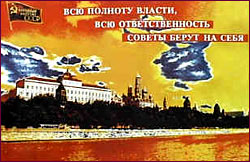 Although
the Bolsheviks were a minority in the first all-Russian congress
of soviets (June), they continued to gain influence. Conservative
and even some moderate elements, who wished to limit the power
of the soviets, rallied around General Kornilov, who attempted
(September, N.S./August, O.S.) to seize Petrograd by force.
At Kerensky's request, the Bolsheviks and other socialists came
to the defense of the provisional government and the attempt
was put down. From mid-September on the Bolsheviks had a majority
in the Petrograd soviet, and Lenin urged the soviet to seize
power. Although
the Bolsheviks were a minority in the first all-Russian congress
of soviets (June), they continued to gain influence. Conservative
and even some moderate elements, who wished to limit the power
of the soviets, rallied around General Kornilov, who attempted
(September, N.S./August, O.S.) to seize Petrograd by force.
At Kerensky's request, the Bolsheviks and other socialists came
to the defense of the provisional government and the attempt
was put down. From mid-September on the Bolsheviks had a majority
in the Petrograd soviet, and Lenin urged the soviet to seize
power.
On the night of Nov. 6, the Bolsheviks staged an coup, engineered
by Trotsky; aided by the workers' Red Guard and the sailors
of Kronstadt, they captured the government buildings and the
Winter Palace in Petrograd. A second all-Russian congress of
soviets met and approved the coup after the Mensheviks and Socialist
Revolutionaries walked out of the meeting. A cabinet, known
as the Council of People's Commissars, was set up with Lenin
as chairman, Trotsky as foreign commissar, Rykov as interior
commissar, and Stalin as commissar of nationalities. The second
congress immediately called for cessation of hostilities, gave
private and church lands to village soviets, and abolished private
property.
|
|
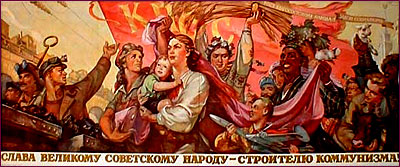
Moscow was soon taken by force, and local groups of
Bolshevik workers and soldiers gained control of most of the
other cities of Russia. The remaining members of the provisional
government were arrested (Kerensky had fled the country).
Old marriage and divorce laws were discarded, the church was
attacked, workers' control was introduced into the factories,
the banks were nationalized, and a supreme economic council
was formed to run the economy. The long-promised constituent
assembly met in Jan., 1918, but its composition being predominantly
non-Bolshevik. it was soon disbanded by Bolshevik troops.
The Cheka (political police), directed by Dzerzhinsky,
was set up to liquidate the opposition.

|
|
|
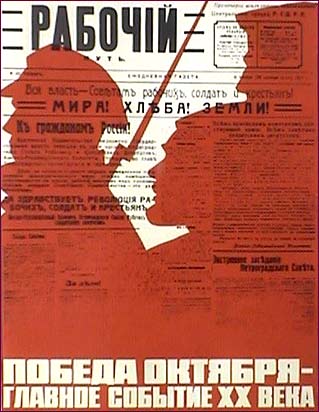
Soviet Poster: "The
victory of the October Revolution - the most important event
of the 20th century."
|

|
Freedom and Revolution
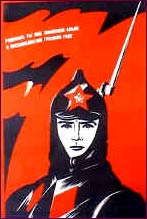 The
Russian Revolution was the first occasion where decades of revolutionary
ideas could be applied to real life. What was theory was now
practice. The struggle between the two concepts of revolution
- the statist-centralist and the libertarian federalist - moved
from the realm of the abstract to the concrete. The
Russian Revolution was the first occasion where decades of revolutionary
ideas could be applied to real life. What was theory was now
practice. The struggle between the two concepts of revolution
- the statist-centralist and the libertarian federalist - moved
from the realm of the abstract to the concrete.
The question thrown up by the October revolution is
fundamental. Once capitalism has been defeated, how is communism
to be achieved? While there are certainly faults to be found
with aspects of the anarchist movement, at least it cannot
be criticised for getting the basics wrong. Anarchists have
consistently argued that freedom and democracy are not optional
extras. Rather they form part of the conditions necessary
for the growth of communism.
|
|
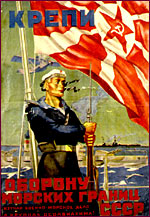 The
answer lies in our conception of socialism. The classic definition
is that of society run according to the dictum "from
each according to his/her ability, to each according to his/her
needs." To anarchists, material equality is
one dimension to socialism, but there is another of equal
importance, that of freedom. The
answer lies in our conception of socialism. The classic definition
is that of society run according to the dictum "from
each according to his/her ability, to each according to his/her
needs." To anarchists, material equality is
one dimension to socialism, but there is another of equal
importance, that of freedom.
The world has enough wealth to provide for all our
material comforts. Socialism seeks to liberate people from
the constant worries about mortgages or landlords, the rising
cost of living and the numerous other issues, trivial yet
vital that grind us down in our daily life. What's more, socialism
must also give us the power to control our own lives, power
to take control of our own destinies. For our entire lives,
from school to the workplace, we are forced to obey somebody
else's order, treated like children or bits of machinery.
Human beings have great potential but for most of us, only
in a socialist society, will this potential be realised.
|
 So
though socialism is about material equality it is also about
freedom. Furthermore it is impossible to maintain one without
the other. As long as power is distributed unequally, a section
of society will continue to have privileges leading to material
advantage. Ultimately society will again be divided into classes,
into those who have and those who have not. Furthermore the
experience of those attempts to manage the economy through an
undemocratic centralised state has also shown that it is unfeasible
to manage and control a complex system without democracy and
accountability. So
though socialism is about material equality it is also about
freedom. Furthermore it is impossible to maintain one without
the other. As long as power is distributed unequally, a section
of society will continue to have privileges leading to material
advantage. Ultimately society will again be divided into classes,
into those who have and those who have not. Furthermore the
experience of those attempts to manage the economy through an
undemocratic centralised state has also shown that it is unfeasible
to manage and control a complex system without democracy and
accountability.
|
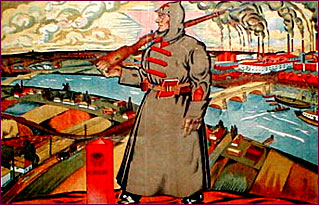
|
|
The revolution must achieve a number of things. It
must defeat the ruling class, removing from them their economic
and political dominance. In place of the bosses, the working
class must in every sphere of activity make the decisions
that ultimately affect them; in factories, communities, schools,
universities, newspapers, television and film studios.
This is the sort of society that is worth fighting
for. However it is not the sort of society that can be achieved
through the dictatorship of a minority over the majority.
Even some Marxists such as Rosa Luxembourg recognised this.
She said, "Socialist practice
demands a total spiritual transformation in the masses degraded
by centuries of bourgeois class rule. Social instincts in
place of egoistic ones, mass initiative in place of inertia,
idealism which overcomes all suffering, etc. etc.... The only
way to a rebirth is the school of public life itself, the
broadest and the most unlimited democracy, and public opinion.
It is rule by terror which demoralises."
Read more about October Revolution at the www.historyguide.org.
|
|



